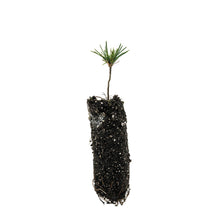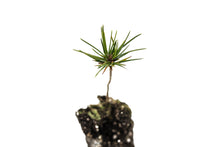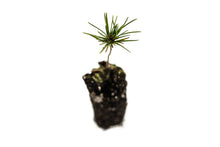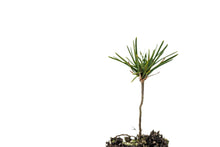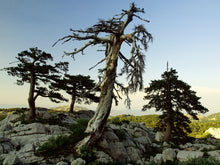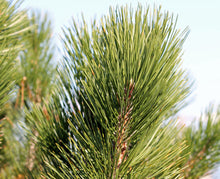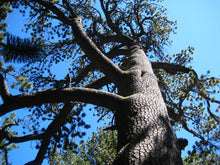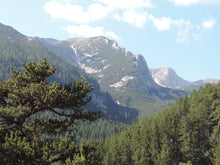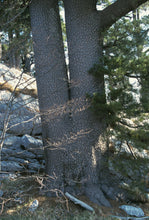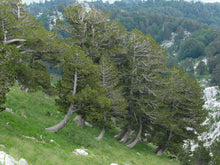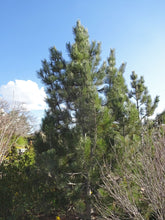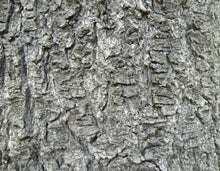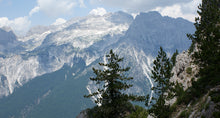
Pinus leucodermis
-
A very tough tree from Europe with a wonderfully refined and stylish appearance!
- 100% guaranteed
- Seed-grown on California's Redwood Coast
- Transplanting and care instructions included
 |
Moisture Low |
 |
Cold Hardiness -30°F |
 |
Light Full Sun / Partial Shade |
 |
Size 50 – 100' tall / 10 – 15' spread |
 |
Lifespan 1,300 yrs |
 |
Growth Rate Slow Growing |
 |
Drought Tolerance High |
 |
Wind Resistance High |
About Bosnian Pine
Here’s a small, dark, and handsome evergreen pine that was discovered on Mount Olympus in Greece in 1863. Is this “The Tree of the Gods”? With its pleasing size, tight and refined habit, and wonderfully-textured foliage decorated with colorful cones and bright-skinned stems, some may think so!
Bosnian Pines were originally documented in two different locations and inadvertently identified by two different names (Pinus leucodermis and Pinus heldreichii) by the two botanists who found them around the same time in the mid-1800s. This led to a bit of taxonomic overlap, but, today, the species is most often identified as Pinus leucodermis. Bosnian Pines are endemic to higher elevations (mostly above 5,000 feet) in the mountains of Bosnia-Herzegovina, Croatia, Bulgaria, Albania, the Republic of Macedonia, Serbia, Greece, and Italy. They have been known by various common names, including: Bosnian Redcone Pine, Herzegovinian Pine, Snakeskin Pine, Graybark Pine, and sometimes Balkan Pine.
A slow to moderate grower, Pinus leucodermis, is a very tough tree with a wonderfully refined and stylish appearance. In wild mountainscapes, this tree grows slowly to over 100 feet tall, but in cultivation, it generally grows faster, yet remains much smaller, usually under 60 feet tall. This tree’s naturally tight form ensures that even mature Bosnian Pines do not extend their branches much more than 10 or 15 feet, giving the tree a narrow, statuesque silhouette in the landscape at any age. Bosnian Pines can live for up to 1,300 years, and several specimens in the Balkans have been numbered among Europe’s oldest trees.
From a very young age, Bosnian Pines take on a dense and neat conical form. They are dark and bolt upright, usually with a strong central trunk and always with a formal, sentinel-like stance. The tree’s stylish needles appear in paired couplets. They are a very dark green — glossy and lustrous — about 3 inches long, formed into thick, brushlike tufts smartly arranged along contrasting glaucous-to-light grey shoots and stiff, upward-curving branches. “Leucodermis” means “white skin,” and likely refers to the thick, ash-gray-to-whitish bark which covers the tree’s stout trunk and the even lighter color of new-growth branchlets. The common name “Snakeskin Pine” also refers to the tree’s light-colored bark, which, over time, flakes to leave yellow patches and separates into snakeskin-like platelets.
The final touch of beauty for this mountain pine comes from its highly ornamental cones. The cones are small, usually under 3 inches long, and charmingly colorful. They emerge in a phosphorescent cobalt-purple, and move through several shades of blue-purple on their way to maturity and a red-brown, or sometimes orange-brown color.
While popular as an ornamental in parks and public gardens throughout Europe since about the turn of the century, Bosnian Pines were almost unseen in America prior to the mid-1970s. Still a relative rarity in North America, there is much to commend planting Pinus leucodermis in a variety of settings and landscapes. This is one of the toughest, most cold-hardy pines on the planet, just fine with heavy winds, snow, ice, and temperatures down to 30°F below zero (a great windbreak or privacy screen). It’s a reliable, consistent grower in all kinds of situations and climates, from sea-level to the timberline; drought-tolerant once established; and highly disease and pest resistant. It is not picky about soil types, and appears largely impervious to air pollution and other urban impacts. Birds and wildlife love this tree. It is fine in full sun, but does not grow as vigorously in hot, humid regions.
For moderate to colder climates, this tree could well prove itself to be “The Tree of the Gods.” Add a couple to your own Mount Olympus!
About Jonsteen's Seedlings
All of our trees are seed-grown at our nursery on California's Redwood Coast, which is inspected monthly and licensed by the California Department of Agriculture. Trees can provide a natural barrier against high winds, temperatures, noise pollution and soil erosion, all while benefiting local air quality, wildlife and property values — a Jonsteen seedling will only grow in value and beauty!
About Jonsteen's 100% Guarantee
All of our trees are guaranteed to arrive healthy and in good condition. If your tree perishes despite your honest efforts, we will be happy to replace it with a small-sized seedling for just the cost of shipping/handling. You can learn more about our guarantee and tree replacement policy here.
Seedling Size Chart: Medium
Due to the dynamic nature of actively growing trees, as well as the tremendous variation between species’ growth rates, we rely on the cubic volume of a seedling’s root mass to determine its “size” (Small / Medium / Large / XL). Within each size there is minor variance — the dimensions provided here represent the category minimum. If exact measurements are essential, please contact us about current stock.














